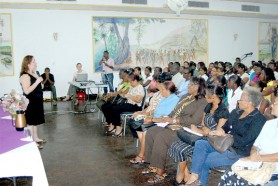Saying that domestic violence doesn’t start with a punch or a stab, US domestic violence prevention specialist, Dr. Beth Feder called for women to be more aware in relationships and recognize that there is a pattern to such behaviour.

“It could be the withholding of finances; forcing you to work and have him pocket the money; he is refusing to work; he is spreading rumours about you and or he is controlling; there is so many things to pick up on so early…” Feder told a public forum on domestic violence hosted by the US Embassy at Hotel Tower yesterday.
Abusive partners are not easy to identify, she emphasized, but pointed out there are identified behaviour and attitudes which are common to abusers. She cited jealousy; rigid sexual roles; threats; family background; and controlling behavior, among others things.
Using a conversational tone and speaking away from the podium, Feder rapped with the sizeable audience that turned out to hear her speak. She opened up with a formal introduction, saying how she could relate to the issue because she was affected through a friend. She disclosed that while she was still a student in college, a friend turned to her for advice on how to handle abuse.
“I was there to support her but had no idea how to advise her so I turned to research and years later I am deeply involved in the area of intimate partner violence,” Feder said. She assured the audience that her friend managed to get out early while her abuser “is still in search of a healthy relationship after all these years.”
Feder’s message was simple; she preached awareness and support systems which are focused on helping victims of abuse as well as the abusers. “Do you really think abusers can change?” someone in the audience asked, minutes after Feder had wrapped up her presentation. Without hesitating, she said, “Yes! But I don’t have high hopes for high numbers”
Recalling some of the cases she has been involved in, she said some abusers changed, adding that it was a process which called for dedication and accountability.
The hot button issues from the floor included the police response to domestic violence and the way forward for victims here who are struggling to find a way out. Feder stressed training at many levels and continued support, but repeatedly mentioned young people, among the groups that ought to be intensely targeted.
Feder said that she met with members of the Guyana Police Force during an interesting session yesterday and she has since committed to providing the force with materials to aid in training. The police here informed her that women do report matters of domestic abuse, but that the figures point to many not mustering the courage to go through with prosecution, after an average of some twenty times of showing up at police stations.
The figures are reportedly the same in other Caribbean countries. According to Feder, there is a need for more social workers to be involved at the level where survivors reach out to the police and she said too that more structured programmes should be in place at the law enforcement agencies to deal with the issues. In addition, she called for police officers to “first show compassion,” noting that it starts with them actually caring about what happened.
Still on the issue of the police, Karen De Souza of Red Thread addressed the audience and opined that even with the ideal police response domestic violence will remain a challenge because “society needs to care.”
DeSouza said that people in communities across the country need to show concern and demonstrate it by looking into what is happening with their sisters, mothers, friends and neighbours. “…We have to ‘mind’ each other’s business because if we don’t women will continue to be murdered by their partners.
Too often we look to the police and the government, which is only part of the solution, each one of us need to take some responsibility,” DeSouza added. Feder supported DeSouza’s comments, saying it helps when people show concern for others, adding that the reality for most women is “home is not safest place.”
Feder also pointed out that domestic abuse is largely calculated, noting that abusive people often chose who to lash out at and when.
She said too that one of the most dangerous times in a battered woman’s life is when she first walks away from her situation. “When she leaves that is one of the most dangerous times in her life. And the other is when she is pregnant,” she added.
The forum also included a discussion on the impact of domestic abuse on children, with Feder saying that the exposure could be harmful. She said there is a high correlation between domestic abuse and child abuse, adding that abusive environments are particularly unhealthy for children.
Feder, a pre-suit manager and attorney, is currently lecturing for the US State Department in the area of domestic violence. During her two-day visit here she met with Human Services Minister, Priya Manickchand, non-governmental organizations and members of the police force.




